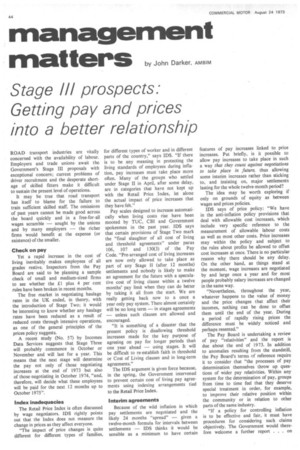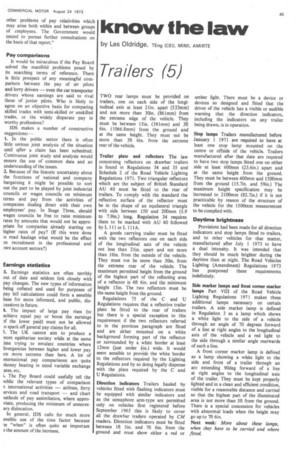management
Page 46

Page 47

If you've noticed an error in this article please click here to report it so we can fix it.
matters by John Darker AM B M
Stage III prospects: Getting pay and prices into a better relationship
ROAD transport industries are vitally concerned with the availability of labour. Employers and trade unions await the Government's Stage III proposals with exceptional concern; current problems of driver recruitment and the desperate shortage of skilled fitters make it difficult to sustain the present level of operations.
It may be true that road transport has itself to blame for the failure to train sufficient skilled staff. The omissions of past years cannot be made good across the board quickly and in a free-for-all wages scramble — sought by the unions and by many employers — the richer firms would benefit at the expense (or existence) of the smaller.
Check on pay Yet a rapid increase in the cost of living inevitably makes employees of all grades restive. Inspectors from the Pay Board are said to be planning a sample check of small and medium-sized firms to see whether the £1 plus 4 per cent rules have been broken in recent months.
The free market in negotiating haulage rates in the UK ended, in theory, with the introduction of Stage Two; it would be interesting to know whether any haulage rates have been reduced as a result of reduced costs through intensive operations, as one of the general principles of the prices policy suggests.
A recent study (No. 57) by Incomes Data Services suggests that Stage Three will probably commence in October or November and will last for a year. This means that the next stage will determine the pay not only of those negotiating increases at the end of 1973 but also of those -negotiating in October 1974, "and, therefore, will decide what these employees will be paid for the next 12 months up to October 1975".
Index inadequacies The Retail Price Index is often discussed by wage negotiators. IDS rightly points out that the Index does not measure the change in prices as they affect everyone.
"The impact of price changes is quite different for different types of families, for different types of worker and in different parts of the country," says IDS. "If there is to he any meaning in protecting the living standards of employees during inflation, pay increases must take place more often. Many of the groups who settled under Stage II in April, after some delay, are in categories that have not kept up with the Retail Price Index, let alone the actual impact of price increases that they have felt."
Pay scales designed to increase automatically when living costs rise have been mooted by TUC, CBI and Government spokesmen in the past year. IDS says that certain provisions of Stage Two mark the "final slaughter of all cost of living and threshold agreements" under paras 106, 107 and 130(3) of the Pay Code. "Pre-arranged cost of living increases are now only allowed to take place as part of any Stage II (after 12 months) settlements and nobody is likely to make an agreement for the future with a speculative cost of living clause within a twelve months' pay limit when they can do better by taking it all from the start. We are really getting back now to a once a year only pay system. There almost certainly will be no long term — in stages agreements — unless such clauses are allowed and encouraged.
"It is something of a disaster that the present policy is disallowing threshold increases made for the key purpose of agreeing on pay for longer periods than one year ahead — using stages. It will be difficult to re-establish faith in threshold or Cost of Living clauses and in long-term agreements."
The IDS argument is given force because, in the spring, the Government intervened to prevent certain cost of living pay agreements using indexing arrangements tied to the Retail Price Index.
Interim agreements Because of the wild inflation in which pay settlements are negotiated and the likely 24 months "spread" — given a twelve-month formula for intervals between settlements — IDS thinks it would be sensible as a minimum to have certain
features of pay increases linked to price increases. Put briefly, is it possible to allow pay increases to take place in such a way that they count against negotiations to take place in future, thus allowing some interim increases rather than sticking to, and insisting on, major settlements lasting for the whole twelve-month period?
The idea may be worth exploring if only on grounds of equity as between wages and prices policies.
IDS says of price policy: "We have in the anti-inflation policy provisions that deal with allowable cost increases, which include very specific reference to the measurement of allowable labour costs as well as most other costs. Price increases may within the policy and subject to the rules about profits be allowed to offset cost increases at once. There is no particular reason why there should be any delay. On the other hand, as things stand at the moment, wage increases are negotiated by and large once a year and for most people probably salary increases are changed in the same way.
"Nevertheless, throughout the year, whatever happens to the value of money and the price changes that affect their incomes, nothing can be done to offset them until the end of the year. During a period of rapidly rising prices the difference must be widely noticed and perhaps resented."
The Pay Board is undertaking a review of pay "relativities" and the report is due about the end of 1973. In addition to anomalies resulting from the standstill, the Pay Board's terms of reference require it to consider that "the processes of pay determination themselves throw up questions of wider pay relativities. Within any system for the determination of pay, groups from time to time feel that they deserve special treatment in order, for example, to improve their relative position within the community or in relation to other parts of the same industry.
"If a policy for controlling inflation is to be effective and fair, it must have procedures for considering such claims objectively. The Government would therefore welcome a further report . . . on other problems of pay relativities which may arise both within and between groups of employees. The Government would intend to pursue further consultations on the basis of that report."
Pay comparisons
It would be miraculous if the Pay Board solved the manifold problems posed by its searching terms of reference. There is little prospect of any meaningful comparison between the pay of air pilots and lorry drivers — even the car transporter drivers whose earnings are said to rival those of junior pilots. Who is likely to agree on an objective basis for comparing skilled trades with semi-skilled or unskilled trades, or the widely disparate pay in worthy professions?
IDS makes a number of constructive suggestions:—
1. In the public sector there is often little serious joint analysis of the situation until after a claim has been submitted. Continuous joint study and analysis would ensure the use of common data and an understanding of the issues.
2. Because of the historic uncertainty about the functions of national and company bargaining it might be possible to sort out the part to be played by joint industrial councils or wages councils on minimum terms and pay from the activities of companies dealing direct with their own employees' pay. In Stage Three, should wages councils be free to raise minimum rates by amounts that would not be appropriate for companies already starting on higher rates of pay? (If this were done in road haulage what would be the effect Dn recruitment in the professional and )wn account sectors?) Earnings statistics 3. Earnings statistics are often terribly out of date and seldom link closely with pay changes. The new types of information being collated and used for purposes of pay bill calculations could form a sensible base for more informed, and public, disaissio ns in future.
4. The impact of large pay rises (to achieve equal pay or boost the earnings 3f the lower paid) must not be allowed :0 spark off general pay claims for all.
5. The UK cannot aim to produce a nore egalitarian society while at the same .ime trying to emulate countries where livergencies between higher and lower pay tre more extreme than here. A lot of nternational pay comparisons are quite )honey bearing in mind variable exchange utes, etc.
i. The Pay Board could usefully tell the mblic the relevant types of comparison n international activities — airlines, ferry ervices and road transport — and chart nethods of pay assimilation, where appro)riate, producing the minimum of unnecesary dislocation.
In general, IDS calls for much more ensible use of the time factor because lie "when" is often quite as important s the amount of the increase.




















































































